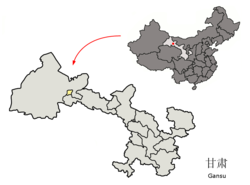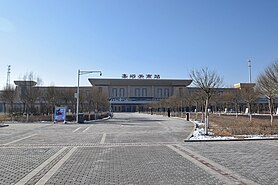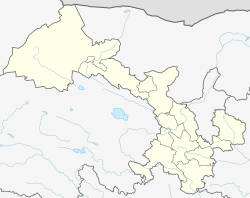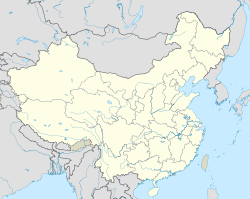This article needs additional citations for verification. (February 2011) |
Jiayuguan (simplified Chinese: 嘉峪关市; traditional Chinese: 嘉峪關市; pinyin: ⓘ) is a prefecture-level city in northwestern Gansu province, with a population of 312,663 as of the 2020 census. Compared with the 231,853 people in the sixth national census in 2010, there was an increase of 80,810 people, with an average annual increase of 3.04%.[3] Its built-up (or metro) area was home to 768,274 inhabitants made of Jiayuguan City and Suzhou urban district of Jiuquan City now being conurbated.[4] It is named after the nearby Jiayu Pass, the largest and most intact pass of the Great Wall of China.
Jiayuguan
嘉峪关市 Chia-yü-kuan | |
|---|---|
Clockwise from top: Jiayu Pass with the city visible in the background, the July 1 Glacier, Jiayuguan South station on the Lanzhou–Xinjiang high-speed railway, statue commemorating Jiayuguan as China's "Top Tourist City", and the Taolai River. | |
 Location of Jiayuguan City jurisdiction in Gansu | |
| Coordinates (Jiayuguan municipal government): 39°46′24″N 98°17′18″E / 39.7732°N 98.2882°E | |
| Country | China |
| Province | Gansu |
| Municipal seat | Gangcheng Subdistrict |
| Area | |
| 1,224 km2 (473 sq mi) | |
| • Urban | 1,224 km2 (473 sq mi) |
| • Metro | 4,577 km2 (1,767 sq mi) |
| Population (2020 census)[1] | |
| 312,663 | |
| • Density | 260/km2 (660/sq mi) |
| • Urban | 312,663 |
| • Urban density | 260/km2 (660/sq mi) |
| • Metro | 768,274 |
| • Metro density | 170/km2 (430/sq mi) |
| GDP[2] | |
| • Prefecture-level city | CN¥ 19.0 billion US$ 3.1 billion |
| • Per capita | CN¥ 78,336 US$ 12,577 |
| Time zone | UTC+8 (CST) |
| Postal code | 735100 |
| ISO 3166 code | CN-GS-02 |
| Website | www |
Jiayuguan is a major industrial city. In 1958, Jiuquan Iron and Steel Works established in Jiuquan, Gansu.[5] In 1965, parts of Jiuquan County and Sunan Yugur Autonomous County (Including Jiuquan Iron and Steel Works) were marked out to establish the County-level Jiayuguan City, which is under the direct jurisdiction of Gansu Government. Following Jiuquan Iron and Steel Works, the largest Iron and Steel Works in Gansu, was assigned to Jiayuguan City, mining and mineral processing are the primary industries of the city. In 1971, Jiayuguan City was changed to a prefecture-level city. By area, it is by far the smallest prefecture-level division of Gansu. It is also one of the four prefecture-level cities which has no districts.
The fortress at Jiayuguan is situated at the end of the portion of the Great Wall of China which was built by the Ming Dynasty, in the 14th century.[6]
Administration
editAs 2019, Jiayuguan City is underdivided 3 towns.[7]
- Towns
- Xincheng(新城镇)
- Yuquan(峪泉镇)
- Wenshu(文殊镇)
Jiayuguan is divided into 2 subdistricts and 3 towns.
| Map | ||
|---|---|---|
| Name | Chinese | Hanyu Pinyin |
| Xiongguan Subdistrict | 雄关街道 | Xióngguān Jiēdào |
| Gangcheng Subdistrict | 长城街道 | Gāngchéng Jiēdào |
| Xincheng town | 新城镇 | Xīnchéng Zhèn |
| Yuquan town | 峪泉镇 | Yùquán Zhèn |
| Wenshu town | 文殊镇 | Wénshū Zhèn |
Transport
editJiayuguan is served by China National Highway 312, and the Lanzhou-Xinjiang and Jiayuguan-Ceke Railways. A 69-km-long branch railway, the Jiajing Railway (嘉镜铁路), runs from Jiayuguan to Jingtieshan (镜铁山矿区).
Jiayuguan is served by the Jiayuguan Jiuquan Airport that offers direct air services to Xi'an on Shanghai Airlines and Beijing on Air China.
Climate
editJiayuguan has a cool arid climate (Köppen BWk), in common with most of northwestern China. Summers feature pleasant mornings and very warm afternoons, whilst winters are freezing to frigid though with essentially no snow due to the extreme aridity produced by the Siberian High.
| Climate data for Jiayuguan | |||||||||||||
|---|---|---|---|---|---|---|---|---|---|---|---|---|---|
| Month | Jan | Feb | Mar | Apr | May | Jun | Jul | Aug | Sep | Oct | Nov | Dec | Year |
| Mean daily maximum °C (°F) | −2 (28) |
3 (38) |
11 (51) |
17 (63) |
22 (72) |
27 (81) |
29 (84) |
28 (83) |
23 (73) |
16 (60) |
6 (42) |
0 (32) |
15 (59) |
| Mean daily minimum °C (°F) | −16 (3) |
−12 (11) |
−4 (25) |
2 (36) |
8 (46) |
13 (55) |
15 (59) |
14 (58) |
8 (47) |
1 (33) |
−7 (20) |
−13 (9) |
1 (34) |
| Average precipitation cm (inches) | 0 (0) |
0.25 (0.1) |
0.51 (0.2) |
0.51 (0.2) |
0.76 (0.3) |
1.0 (0.4) |
1.8 (0.7) |
2.8 (1.1) |
0.51 (0.2) |
0 (0) |
0.25 (0.1) |
0.25 (0.1) |
8.64 (3.4) |
| Source: Weatherbase [8] | |||||||||||||
See also
editReferences
edit- ^ "China: Gānsù (Prefectures, Cities, Districts and Counties) - Population Statistics, Charts and Map".
- ^ 甘肃省统计局、国家统计局甘肃调查总队 (November 2016). 《甘肃发展年鉴-2016》. China Statistics Press. ISBN 978-7-5037-7894-0.
- ^ "嘉峪关市第七次全国人口普查公报". tjj.jyg.gov.cn. Archived from the original on 2022-03-23. Retrieved 2022-04-28.
- ^ "China: Gānsù (Prefectures, Cities, Districts and Counties) - Population Statistics, Charts and Map".
- ^ This is the old administrative division. In 1958, Jiuquan County and Jinta County were merged to form the prefecture-level Jiuquan City (It is different from prefecture-level Jiuquan City today) until 1961.
- ^ Gore, Rick (March 1980). "Journey to China's Far West". National Geographic. Vol. 157, no. 3. p. 314. ISSN 0027-9358. OCLC 643483454.
- ^ "统计用区划代码 www.stats.gov.cn" (in Chinese). XZQH. Retrieved 2020-12-27.
- ^ "Weatherbase: Historical Weather for Jiayuguan, China". 2011. Retrieved on November 24, 2011.
External links
edit- Jiayuguan travel guide from Wikivoyage
- Official website, City of Jiayuguan





